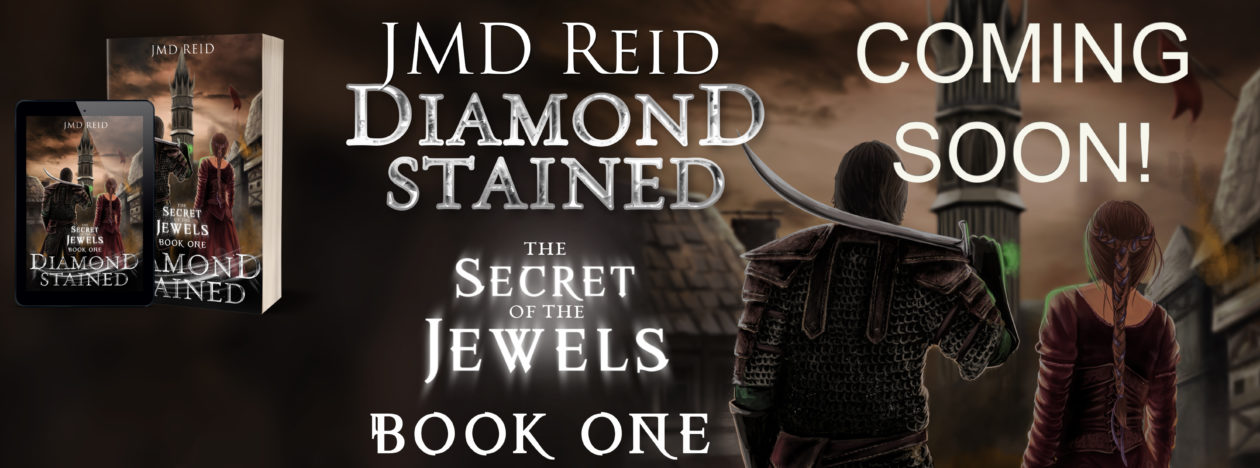Every book you read can teach you something to help improve your writing from pitfalls to avoid to examples to follow, and in this series of blog posts I’m going to talk about the authors that have had the most impact on me and my writing, and what I took away from them. Today is David Eddings.
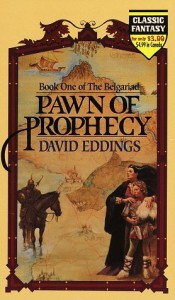 If you don’t know, David Eddings wrote several popular fantasy series first by himself and later with his wife, Leigh, sharing a co-author credit. He also says his wife deserves the co-author credit for all his writings. Like me, David Eddings grew up near the Puget Sound and it definitively showed in his writing. It rains a lot in his books, and his characters are always worrying about the weather. If you didn’t know it, the Seattle region from October through May is almost always gray skies and drizzling rain.
If you don’t know, David Eddings wrote several popular fantasy series first by himself and later with his wife, Leigh, sharing a co-author credit. He also says his wife deserves the co-author credit for all his writings. Like me, David Eddings grew up near the Puget Sound and it definitively showed in his writing. It rains a lot in his books, and his characters are always worrying about the weather. If you didn’t know it, the Seattle region from October through May is almost always gray skies and drizzling rain.
I was introduced to David Eddings by my mother. I was in the sixth grade and we had just moved back to South Hill, Washington. My dad was in the Air Force and we had just spend the last two-and-a-half years in Alamagordo, New Mexico. Previously we had lived in Washington and my parents had rented out the house they owned in 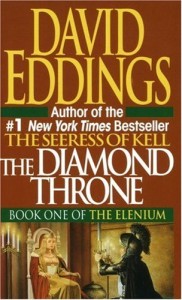 South Hill while we were exiled (as I thought of it) to New Mexico. When we moved back, I thought my life was back on track and I was finally free of that hot, dry, and very dust state. Only I had friends in New Mexico, and when I moved back I learned my best friend had in Washington had moved away, and the only kid in the neighborhood I didn’t get along with before moving. I was getting picked on at school and was miserable, so my mom, knowing I had just gotten into the Lord of the Rings, went to the local Waldonbooks and asked the clerk what a good fantasy book would be. And he recommended ‘Pawn of Prophecy’.
South Hill while we were exiled (as I thought of it) to New Mexico. When we moved back, I thought my life was back on track and I was finally free of that hot, dry, and very dust state. Only I had friends in New Mexico, and when I moved back I learned my best friend had in Washington had moved away, and the only kid in the neighborhood I didn’t get along with before moving. I was getting picked on at school and was miserable, so my mom, knowing I had just gotten into the Lord of the Rings, went to the local Waldonbooks and asked the clerk what a good fantasy book would be. And he recommended ‘Pawn of Prophecy’.
‘Pawn of Prophecy’ would probably be counted as Young Adult these days, and it and its sequels were the perfect books for a lonely, preteen boy. You follow Garion as he goes from anonymous scullion to saving the world in the five book ‘Belgariad’ series. It’s a fun series with great characters, and is one of the best quest-driven fantasy series I have ever read as you follow Garion and his companions on a journey around their world.
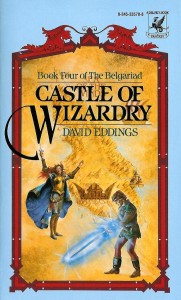 I learned two lessons in writing from David Eddings and the first was dialogue. David Eddings was a master at witty, bantering dialogue. His characters have great personality and they display them in their words, often to humorous effect. My poor DM (Dungeon Master or the guy who runs a Roleplaying Game session, such as D&D) can attest to my love of banter and mocking my enemies as I fight them, mocking his enemies as they try and reveal their evil plans, and it’s all because of David Eddings. His heroes always make light in the face of their enemies with a fun bravado worthy of a hero of an epic story.
I learned two lessons in writing from David Eddings and the first was dialogue. David Eddings was a master at witty, bantering dialogue. His characters have great personality and they display them in their words, often to humorous effect. My poor DM (Dungeon Master or the guy who runs a Roleplaying Game session, such as D&D) can attest to my love of banter and mocking my enemies as I fight them, mocking his enemies as they try and reveal their evil plans, and it’s all because of David Eddings. His heroes always make light in the face of their enemies with a fun bravado worthy of a hero of an epic story.
Great dialogue makes your characters come alive and feel like real, fleshed out people. And if you can make people believe your characters are real, guess what, they come to care about them. They want your characters to succeed, to be happy, their rooting for them. An emotional connection is formed, an investment that will keep your readers coming back for more. You can have the idea for the most amazing, thought-provoking, never-been-done story, but if your character dialogue is flat and boring, people might never make it far enough into your book to discover this fact.
 The second lesson I learned is the love of the journey. David Eddings is most known for two universes the Belgariad/Mallorean (consisting of two pentalogies, two stand-alone novels, and a book on the world building) and the Elenium/Tamuli (consisting of two trilogies). The four series are all quests stories with our heroes traveling across the known world in the hunt of their goals. They travel, they see the world, and experience diverse cultures. When you open a David Eddings novel there’s a map, and by the time the series is over, the heroes will have traveled through every land depicted, sharing you the world he’s created, and doing so in a very logical manner. It doesn’t feel forced as his characters somehow travel through ever local for the sake of it, his story plotting was very well done.
The second lesson I learned is the love of the journey. David Eddings is most known for two universes the Belgariad/Mallorean (consisting of two pentalogies, two stand-alone novels, and a book on the world building) and the Elenium/Tamuli (consisting of two trilogies). The four series are all quests stories with our heroes traveling across the known world in the hunt of their goals. They travel, they see the world, and experience diverse cultures. When you open a David Eddings novel there’s a map, and by the time the series is over, the heroes will have traveled through every land depicted, sharing you the world he’s created, and doing so in a very logical manner. It doesn’t feel forced as his characters somehow travel through ever local for the sake of it, his story plotting was very well done.
So a lot of his novels are about the journey. What the characters experience and learn as they travel in the pursuit of their goals. They make you want to go out and wander through the world and just experience life. His books had a sense of adventure and life to them that made you want to keep reading and find out what happens next. With a book, it’s not the destination that really matters, it’s how you get your characters to that point. If you don’t write them a great journey, your readers will not stay on the road with them. So give them the best journey you can, full of interesting obstacles, clever enemies, and dangers for them to overcome.
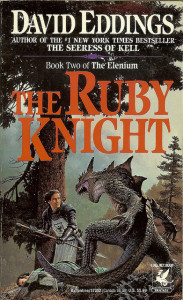 Your journey doesn’t have to be crossing the known world, it could be as simple as going to the local store, navigating through politics, exploring an excavated ruin, traversing the minutiae of the legal system, or even a trip through the shattered psyche of your character. Make it interesting and keep your readers engaged!
Your journey doesn’t have to be crossing the known world, it could be as simple as going to the local store, navigating through politics, exploring an excavated ruin, traversing the minutiae of the legal system, or even a trip through the shattered psyche of your character. Make it interesting and keep your readers engaged!
Great dialogue and a great journey are what I took away from David Eddings work. Make your characters seem real and give them an interesting journey and your readers will stick with you to the end, then will look forward to the next book you write. And that’s what all of us struggling writers are looking for, fans who will love the worlds we share with them.
 My beta reader for my WIP, the amazing Valerie Hemlin, gave me a wonderful bit of advice: readers want to “feel, smell, breathe, and taste the world he’s in.”
My beta reader for my WIP, the amazing Valerie Hemlin, gave me a wonderful bit of advice: readers want to “feel, smell, breathe, and taste the world he’s in.” If you can make it feel as vibrant as our world, your readers will fall in love with it. Half the fun of reading Fantasy, at least to me, is the world building. Worlds that could never exist in our universe can be brought to life by a skilled author. People read fiction for entertainment, to escape whatever problems they face in their world. So take them to fantastic places, wow them with your creativity. Get them excited and talking about what they read.
If you can make it feel as vibrant as our world, your readers will fall in love with it. Half the fun of reading Fantasy, at least to me, is the world building. Worlds that could never exist in our universe can be brought to life by a skilled author. People read fiction for entertainment, to escape whatever problems they face in their world. So take them to fantastic places, wow them with your creativity. Get them excited and talking about what they read.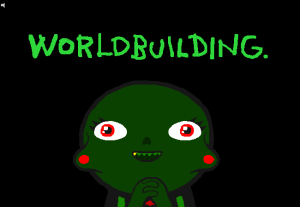 So don’t skip the little stuff. Don’t get too caught up in the grand plot that you’re unfolding. If people don’t care about the world you’re putting at stake, then why are they going to keep on reading? Make it real, make it believable. Let your readers “feel, smell, breathe, and taste” your imaginative universe.
So don’t skip the little stuff. Don’t get too caught up in the grand plot that you’re unfolding. If people don’t care about the world you’re putting at stake, then why are they going to keep on reading? Make it real, make it believable. Let your readers “feel, smell, breathe, and taste” your imaginative universe.